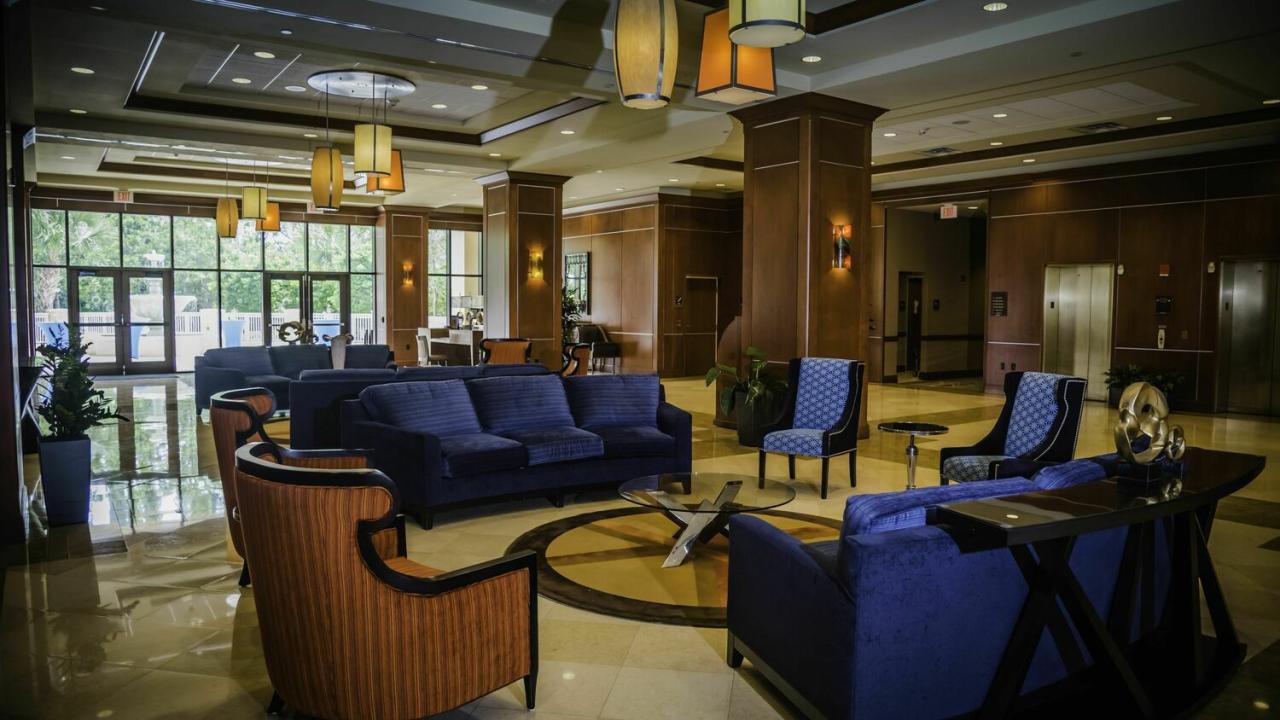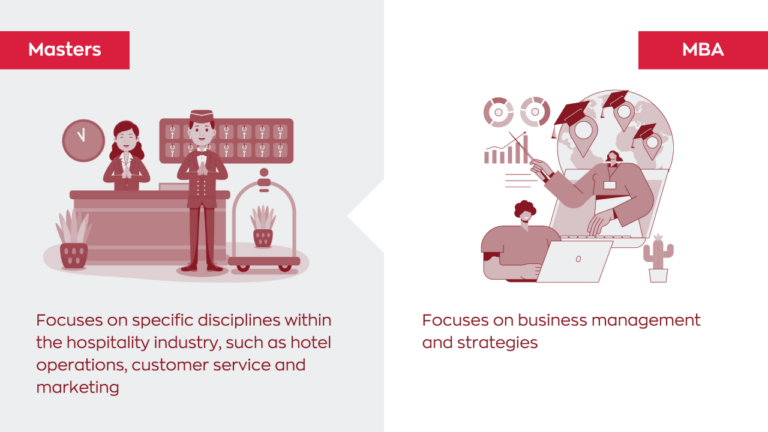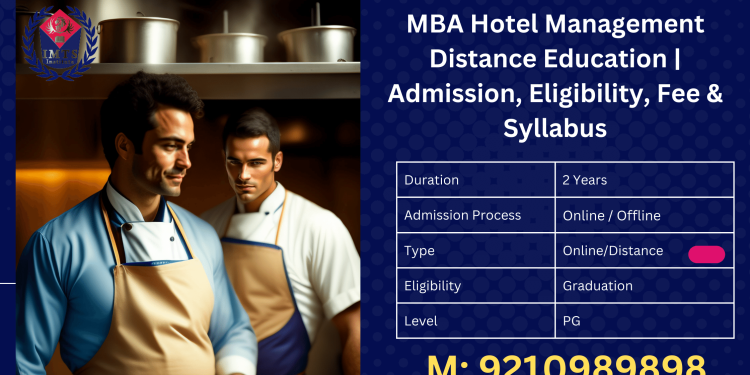Hospitality Business Online MBA A Comprehensive Guide
Hospitality business online MBA programs offer a flexible and convenient pathway to a rewarding career in the hospitality industry. This rapidly evolving sector demands skilled professionals with strong business acumen, and an online MBA provides the perfect blend of theoretical knowledge and practical application. This guide explores the market landscape, career prospects, curriculum details, technological integrations, and financial considerations associated with pursuing this valuable qualification.
We delve into the specifics of various programs, comparing curricula, costs, and career services offered by leading universities. We will also examine the skills employers value most highly in hospitality management graduates and explore how networking and internships contribute to successful job placement. Furthermore, this guide will analyze the return on investment (ROI) associated with an online MBA in hospitality, providing a comprehensive overview to help you make an informed decision about your future.
Market Analysis of Online MBA Programs in Hospitality

The hospitality industry, encompassing hotels, restaurants, tourism, and events, is experiencing a period of significant transformation driven by technological advancements, evolving consumer preferences, and global economic shifts. This dynamic environment necessitates a skilled workforce equipped with advanced business acumen, and online MBA programs specializing in hospitality are increasingly meeting this demand. This analysis explores the current market landscape of these programs, examining their growth potential, curriculum comparisons, key demographic trends, and cost considerations.
Current Market Size and Growth Potential
The market for online MBA programs, generally, is experiencing robust growth, fueled by the increasing accessibility and flexibility these programs offer. While precise market size data specifically for online hospitality MBAs is limited, the overall growth in online education and the increasing demand for specialized management skills within the hospitality sector strongly suggest significant potential. The rise of online learning platforms and the increasing adoption of blended learning models contribute to this expansion.
For example, the growth of online learning platforms like Coursera and edX, coupled with the increasing number of universities offering online hospitality MBA programs, indicates a growing market. We can reasonably project continued growth based on the ongoing digital transformation of the hospitality industry and the increasing need for managers with specialized knowledge in areas like revenue management, digital marketing, and sustainable tourism.
Curriculum Comparison of Top-Ranked Programs
Top-ranked online MBA programs in hospitality typically share a core curriculum encompassing fundamental business principles such as finance, accounting, and marketing. However, they differentiate themselves through specialized electives and concentrations. For instance, some programs might offer concentrations in hotel management, culinary business, or tourism development, while others focus on areas like digital hospitality or sustainable tourism management. A common thread among these programs is the integration of real-world case studies, simulations, and potentially industry projects to provide students with practical, applicable skills.
The curriculum often incorporates technology-focused courses to equip graduates with the skills needed to navigate the digital landscape of the hospitality industry.
Key Demographic Trends Influencing Demand
Several demographic trends are driving the demand for online hospitality MBAs. The increasing number of working professionals seeking career advancement opportunities without interrupting their employment is a significant factor. The flexibility of online learning allows individuals to pursue higher education while maintaining their current jobs and responsibilities. Furthermore, the growing diversity within the hospitality industry is reflected in the student body of these programs, with professionals from various backgrounds and experience levels seeking advanced management skills.
Finally, the increasing focus on sustainability and responsible tourism is influencing curriculum design and attracting students interested in a more ethical and environmentally conscious approach to hospitality management.
Program Costs, Duration, and Career Services
The following table compares program costs, duration, and career services offered by five different universities offering online MBAs in hospitality (Note: Data is illustrative and may vary; always check directly with the university for the most up-to-date information).
| University | Program Cost (USD) (Estimate) | Program Duration | Career Services |
|---|---|---|---|
| University A | $50,000 – $70,000 | 18-24 months | Career counseling, resume review, job placement assistance |
| University B | $40,000 – $60,000 | 12-18 months | Networking events, alumni mentorship, internship opportunities |
| University C | $60,000 – $80,000 | 24 months | Job search workshops, online job boards, salary negotiation support |
| University D | $35,000 – $55,000 | 15-21 months | Career fairs, resume and cover letter critiques, interview preparation |
| University E | $55,000 – $75,000 | 20 months | Individual career coaching, industry connections, job placement guarantee (with caveats) |
Technology and Online Learning Experience
The successful delivery of a high-quality online MBA in hospitality relies heavily on the strategic integration of technology. This goes beyond simply hosting lectures online; it involves creating an immersive and engaging learning environment that mirrors, and in some cases surpasses, the benefits of a traditional classroom. Effective technology implementation fosters collaboration, enhances accessibility, and provides opportunities for personalized learning experiences.Technology plays a crucial role in overcoming the geographical limitations inherent in traditional education.
It allows students from diverse locations and backgrounds to participate in a single program, fostering a rich exchange of perspectives and experiences. Furthermore, the flexibility offered by online learning caters to the diverse schedules and commitments of working professionals, a significant demographic within the hospitality MBA target market. However, challenges exist in maintaining student engagement and ensuring effective communication in a virtual environment.
Careful consideration must be given to the selection and implementation of technologies to maximize their potential while mitigating any drawbacks.
Technologies Enhancing Student Engagement and Collaboration
Effective online learning requires more than just uploading lecture recordings. A variety of technologies are employed to foster interaction, collaboration, and a sense of community amongst students. Learning management systems (LMS) such as Moodle or Canvas serve as central hubs for course materials, assignments, and communication. These platforms often integrate features like discussion forums, allowing students to engage in debates and share insights.
Video conferencing tools like Zoom or Microsoft Teams facilitate real-time interaction during live lectures and group projects, enabling face-to-face communication and collaborative work. Furthermore, collaborative document editing tools like Google Docs allow for simultaneous work on projects, fostering teamwork and enhancing efficiency.
Virtual and Augmented Reality Applications in Hospitality Education
Virtual and augmented reality (VR/AR) technologies offer transformative potential for hospitality education. Imagine a VR application simulating the operation of a hotel. Students could virtually “walk through” a hotel lobby, interact with a virtual receptionist, check in a virtual guest, and manage virtual room assignments. This immersive experience would allow students to practice real-world scenarios in a risk-free environment, developing their problem-solving skills and improving their understanding of hotel operations.
Similarly, AR could overlay digital information onto real-world objects. For example, students could use an AR app to scan a hotel room and view digital overlays providing information about the room’s layout, amenities, and maintenance history. This blended approach combines the practical experience of a physical environment with the enhanced understanding provided by digital data. Such applications would allow students to gain practical experience and improve their decision-making skills in a safe and controlled setting, preparing them for real-world challenges.
Financial Aspects and Return on Investment (ROI): Hospitality Business Online MBA

Pursuing an online MBA in hospitality requires a significant financial commitment. Understanding the costs involved and the potential return on that investment is crucial for prospective students. This section will analyze the financial aspects of such programs, comparing costs with potential salary increases and career advancement opportunities to illustrate the overall ROI.
Cost of Online MBA Programs in Hospitality
Tuition fees for online MBA programs in hospitality vary considerably depending on the institution’s reputation, location, and program length. Generally, expect to pay anywhere from $20,000 to $100,000 or more for the entire program. Additional expenses include books and materials, technology costs (laptop, software, internet access), and potential travel expenses for any required on-campus components or networking events.
Some programs may offer scholarships or financial aid, which can significantly reduce the overall cost. It’s vital to thoroughly research all costs associated with a specific program before enrolling.
Salary Increases and Career Advancement Opportunities, Hospitality business online MBA
Graduates of online MBA programs in hospitality often report significant salary increases and career advancement opportunities. The exact amount of increase varies based on prior experience, job role, and geographic location. However, many find that the enhanced skills and knowledge gained through the program allow them to secure higher-paying positions with greater responsibility. For example, a hospitality manager with a bachelor’s degree might earn $60,000 annually, while the same individual with an MBA might command a salary of $80,000 or more.
Similarly, an MBA can open doors to senior management roles, such as regional director or vice president, which typically offer substantially higher salaries and benefits.
Factors Influencing the ROI of an Online MBA in Hospitality
Several factors influence the ROI of an online MBA in hospitality. These include the program’s reputation and accreditation, the student’s prior experience and career goals, the job market conditions in their geographic location, and the student’s ability to leverage their new skills and network effectively. A well-respected program from a reputable institution is more likely to lead to better job prospects and higher salaries.
Similarly, students with strong pre-existing experience in the hospitality industry are likely to see a greater return on their investment than those with limited experience. Finally, networking opportunities provided by the program and the student’s ability to apply their newly acquired knowledge to their career can significantly impact their ROI.
Hypothetical ROI Scenario
The following scenario illustrates the potential ROI for a student pursuing an online MBA in hospitality. This is a simplified example and actual results may vary.
| Year | Salary | Expenses (including tuition amortized) | Net Profit |
|---|---|---|---|
| 0 (Pre-MBA) | $60,000 | $0 | $60,000 |
| 1 | $60,000 | $10,000 | $50,000 |
| 2 | $60,000 | $10,000 | $50,000 |
| 3 | $80,000 | $0 | $80,000 |
| 4 | $90,000 | $0 | $90,000 |
| 5 | $100,000 | $0 | $100,000 |
This hypothetical scenario assumes a $20,000 tuition cost amortized over two years, a pre-MBA salary of $60,000, and significant salary increases after graduation. This illustrates the potential for a strong positive ROI over a five-year period. However, it’s important to remember that this is just one possible scenario, and individual results will vary.
Outcome Summary

In conclusion, pursuing a Hospitality business online MBA presents a compelling opportunity for individuals seeking a dynamic and rewarding career in the hospitality sector. The flexibility of online learning, combined with the robust curriculum and valuable networking opportunities, positions graduates for success in a competitive market. By carefully considering the factors discussed—market trends, career paths, program structures, technological integrations, and financial implications—prospective students can make an informed decision that aligns with their career aspirations and financial goals.
The hospitality industry is thriving, and an online MBA is a strategic investment in your future.
Commonly Asked Questions
What are the admission requirements for an online Hospitality business MBA program?
Admission requirements vary by institution but generally include a bachelor’s degree, GMAT or GRE scores (sometimes waived), professional experience, and letters of recommendation.
Can I transfer credits from a previous degree program?
Many programs allow for credit transfer, but the acceptance of credits depends on the institution’s policies and the nature of the previous coursework. It’s crucial to check with the specific university’s admissions office.
Are there scholarships or financial aid options available for online MBA programs?
Yes, many universities offer scholarships, grants, and other forms of financial aid to online MBA students. Check with the financial aid office of the university you are interested in.
How long does it typically take to complete an online Hospitality business MBA?
The duration varies, but most programs can be completed in 18 to 24 months, depending on the program’s structure and the student’s pace.
What kind of technology do I need to participate in an online MBA program?
A reliable computer with internet access, webcam, and microphone are typically required. Specific software requirements will be Artikeld by the university.





